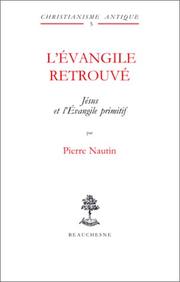| Listing 1 - 10 of 154 | << page >> |
Sort by
|
Book
Year: 1899 Publisher: Freiburg im Breisgau : Mohr,
Abstract | Keywords | Export | Availability | Bookmark
 Loading...
Loading...Choose an application
- Reference Manager
- EndNote
- RefWorks (Direct export to RefWorks)
Book
ISBN: 9519217029 9789519217024 Year: 1987 Volume: 47 Publisher: Helsinki: Suomen Eksegeettinen Seura,
Abstract | Keywords | Export | Availability | Bookmark
 Loading...
Loading...Choose an application
- Reference Manager
- EndNote
- RefWorks (Direct export to RefWorks)
Book
ISBN: 3825836738 9783825836733 Year: 1998 Volume: 14 Publisher: Münster: Lit,
Abstract | Keywords | Export | Availability | Bookmark
 Loading...
Loading...Choose an application
- Reference Manager
- EndNote
- RefWorks (Direct export to RefWorks)
Book
ISBN: 0905774809 0905774817 9780905774817 9780905774800 Year: 1984 Volume: 7 Publisher: Sheffield: JSOT,
Abstract | Keywords | Export | Availability | Bookmark
 Loading...
Loading...Choose an application
- Reference Manager
- EndNote
- RefWorks (Direct export to RefWorks)
Book
ISSN: 12848034 ISBN: 9782204083324 2204083321 Year: 2007 Publisher: Paris: Cerf,
Abstract | Keywords | Export | Availability | Bookmark
 Loading...
Loading...Choose an application
- Reference Manager
- EndNote
- RefWorks (Direct export to RefWorks)
Pour composer leurs évangiles, Matthieu et Luc ont très certainement disposé de l'évangile de Marc, mais fort probablement aussi d'un document, aujourd'hui perdu. Ce document - " la Source " ou " Q " (de l'allemand Quelle, source) - a récemment fait l'objet d'une reconstitution par trois spécialistes de réputation internationale. L'auteur propose une traduction en français de leur texte grec (un livret séparé en facilite la lecture et la consultation) : il vise prioritairement à mettre en valeur le sent des paroles recueillies. Puis il questionne la Source sur le message de Jésus, les gens auxquels il était adressé, le monde nouveau dont Jésus annonçait l'avènement. Sous le discours, on voit se dessiner la personne de Jésus et aussi une image inattendue de Dieu. La source a fixé une autre filière de la tradition évangélique que celle recueillie (et organiste en récit) par Marc. L'essentiel se présente comme une simple collection de paroles de Jésus ; le tout constitue alors un évangile sans récit de la Passion. L'auteur consacre deux chapitres substantiels à une comparaison détaillée de ces deux filières. La tradition évangélique a eu elle-même une vie, donc une histoire. Certains recoupements apparaissent comme particulièrement saisissants et laissent l'impression qu'on n'est vraiment pas loin des paroles mêmes de Jésus.
Book
ISBN: 9780567383501 9780567387165 0567383504 056738716X Year: 2012 Volume: 469-470 Publisher: Londres: T&T Clark International,
Abstract | Keywords | Export | Availability | Bookmark
 Loading...
Loading...Choose an application
- Reference Manager
- EndNote
- RefWorks (Direct export to RefWorks)
Book
ISBN: 9781433197772 1433197774 9781433166051 9781433166020 9781433166037 9781433166044 1433166054 Year: 2020 Publisher: Berlin: Lang,
Abstract | Keywords | Export | Availability | Bookmark
 Loading...
Loading...Choose an application
- Reference Manager
- EndNote
- RefWorks (Direct export to RefWorks)
In this landmark study of the literary relationship between the gospel of John and the synoptic gospels, Gary Greenberg presents compelling evidence for the existence of a written pre-canonical Alpha gospel that contained almost all of the main episodes in the adult life of Jesus (excluding major speeches, such as discourses, parables, and "I Am" sayings) and which became the written source for the core biography of Jesus in Mark, Luke, John, and Matthew. While Mark used the Alpha gospel with only slight variations, John had profound theological disagreements with it, objecting to its theological message about how to obtain eternal life, the depiction of Jesus, and other matters. This induced him to rewrite the Alpha gospel so that it conformed to his own very different theological agenda. Consequently, John’s gospel functions as a thorough theological critique of Mark, but the changes he introduced made it difficult to see how he and Mark worked from the same written source. By using John’s theological concerns as a filter for reading and understanding what objections John would have with Mark’s Jesus stories, The Case for a Proto-Gospel reverse-engineers the editorial path taken by John and reconstructs the content of the Alpha gospel. Finally, the author discusses the relationship of the other two synoptic gospels to the Alpha gospel, asserting that Luke also knew the Alpha gospel but used Mark as his primary source, and that while Matthew did not know the Alpha gospel, his use of Mark as a primary source ensured that his core biography of Jesus also derived from this earlier source.
Book
ISBN: 9783161624971 3161624971 9783161624964 Year: 2023 Publisher: Tübingen Mohr Siebeck
Abstract | Keywords | Export | Availability | Bookmark
 Loading...
Loading...Choose an application
- Reference Manager
- EndNote
- RefWorks (Direct export to RefWorks)
Jesus of Nazareth as Messianic teacher stood at the beginning of the Gospel tradition. Rainer Riesner shows that his poetically formed teaching summaries and evocative parables could be impressed on the memory of his hearers and that a continuity of transmission reaching to the Synoptic Gospels existed through the circle of his disciples.“Riesner has done about as masterful a job as possible in illustrating his thesis of the possibility, plausibility, and even necessity for a historically reliable pre-Easter beginning of the gospel tradition.”John P. Heil in Catholic Biblical Quarterly, Vol. 45, No. 4, 1983, pp. 702–703

ISSN: 01813269 ISBN: 2701013763 9782701013763 Year: 1998 Volume: 5 Publisher: Paris: Beauchesne,
Abstract | Keywords | Export | Availability | Bookmark
 Loading...
Loading...Choose an application
- Reference Manager
- EndNote
- RefWorks (Direct export to RefWorks)
Book
ISBN: 9519217207 3525536445 9789519217208 9783525536445 Year: 1996 Volume: 65 Publisher: Göttingen: Vandenhoeck und Ruprecht,
Abstract | Keywords | Export | Availability | Bookmark
 Loading...
Loading...Choose an application
- Reference Manager
- EndNote
- RefWorks (Direct export to RefWorks)
| Listing 1 - 10 of 154 | << page >> |
Sort by
|

 Search
Search Feedback
Feedback About UniCat
About UniCat  Help
Help News
News